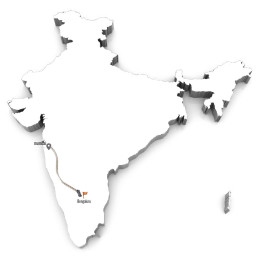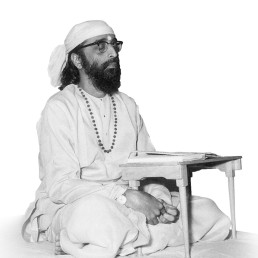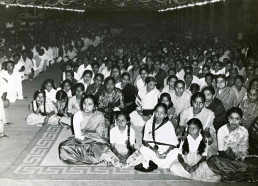
Jnana Yajna 52

Year & Dates:
January 26, 1959 to February 17, 1959

Yajna Topic:
Shrimad Bhagavad Gita- Chapter 2

Place:
Bengaluru, India.
The announcement in Cantonment Railway Station, Bengaluru of the arrival of the train carrying the adored and revered Swami Chinmayananda, the elated meet and greet, the traditional reception at the Odakathur Mutt, and the informal satsang before everyone rushed to get ready for the formal inauguration of the 52nd Jnana Yajna on January 26, 1959 – joyfully predictable but ever refreshing was the way Pujya Gurudev’s Jnana Yajnas were welcomed anywhere they were conducted.
For thousands of seekers, time would take a special meaning the minute Pujya Gurudev arrived in the Yajnashala. As the crowds poured in ahead of time into the expansive pandal set up in the middle of the city, the orderliness and serenity that prevailed was and is a thing of wonder.
Extraordinary, Unshakable Harmony
None wanted to miss the majestic entrance of Pujya Gurudev into the overflowing yajnashala at exactly 6 pm with the Elaya Raja of Travancore. The inaugural ceremony progressed smoothly with the energizing Om flag, the respectful welcome, an appreciative inaugural address by the royal dignitary, and the Krishna -Arjuna- Samvaada canvas unveiled.
With His voice that could enter a million hearts at once, Pujya Gurudev invoked the power of Om and began with a metaphoric comparison. Like children who exhaust themselves in the playground, the majority run around the world scorched by life’s demands. And, religion, like the caring mother, watches and waits, ready to refresh the panting and the tired. Pujya Gurudev continued, “Rank materialism will not survive long, and mere spiritualism alone cannot thrive. There must be a harmonious blending – a happy nuptial between the two which alone will pave the way to prosperity and happiness.” Gita is for any age or stage. He emphasized how the second chapter, especially, was a sweeping and practical overview of the perfect science of life.
The second chapter of the Gita is a flight to the Highest, particularly when Pujya Gurudev pilots the learning. From verse to verse, He charted the course with the illuminating words of Bhagavan Krishna. To prepare the physical with selfless action, to purify the emotional with devotion, to educate the intellect with the Supreme Knowledge, and to sublimate the spiritual through renunciation, the second chapter with Pujya Gurudev was a lofty experience; the audience, captivated, grew in numbers. When one day, heavy rains just before a discourse flooded the yajnashala, drenched everyone, and interrupted electric supply, Pujya Gurudev sat with the wet, cold devotees singing bhajans ardently; Lord Varuna withdrew the rains and the rest of the yajna was an undisturbed flow from an eloquent, established Master.

“Think,” Says Pujya Gurudev
“Water cannot wet It” Things get soaked only when they have got inter-spaces in themselves. A piece of bread can be soaked in water or milk but a piece of iron cannot be soaked, as iron has no enter-space in it. When the substance is one homogeneous mass containing nothing other than itself to condition it, water cannot enter the substance and therefore cannot soak it. Another method of destruction observed is either through the quick effects of water, that is drowning etc. or through the slow effects of mixture, such as corroding etc. Even these are not available in destroying the Truth.
When we read these declarations of Lord Krishna that the Self cannot be even touched much less destroyed by fire, water etc., We are reminded of the significant allegorical story in Kenopanishad. It has been beautifully indicated in the wondrous suggestive language of the inimitable Rshi, that Lord Agni, Vayu, etc., have no power of their own, except that which are allowed to them by the Eternal, the Absolute.
From Tyagi Magazine
Let’s watch the drama of Life!
How can we learn the art of witnessing joy and sorrow without being swayed by life’s ups and downs? What is the path to lasting tranquility and fulfillment? By rising above the pursuit of desires, what can one gain? Join us as we explore these questions and seek insights from Swami Chinmayananda’s teachings.

